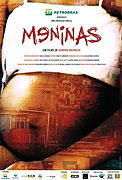
Inhalte(1)
An ihrem 13. Geburtstag bemerkt Evelin, dass sie schwanger ist. Geschwängert hat sie ihr 22 Jahre alter Freund, der erst vor kurzem aufgehört hat, für die Dealer in Rocinha, der größten Favela in Rio de Janeiro, zu arbeiten. Anders als Evelin es von ihm erwartet hätte, freut er sich darauf, Vater zu werden.
Die Möglichkeit einer Abtreibung hat auch die 15 Jahre alte Luana nicht in Erwägung gezogen, als sie von ihrer Schwangerschaft erfuhr. Ihr Vater ist gestorben, als sie noch sehr jung war. Seither lebt sie mit vier jüngeren Schwestern und ihrer Mutter in einem reinen Frauenhaushalt. Schon als Kind musste sie ihrer Mutter helfen, die jüngeren Mädchen großzuziehen. In letzter Zeit hat sie häufiger mal daran gedacht, ein Baby zu bekommen, „das ihr alleine gehört".
Edilene hat ihre Schwangerschaft nicht geplant, aber auch nichts unternommen, um sie zu vermeiden. Das Gleiche gilt für ihre Mutter, so dass Mutter und Tochter nun gleichzeitig schwanger sind. Edilene erwartet einen Sohn von Alex, den sie sehr liebt. Alex aber ist ein Don Juan – auch die 15 Jahre alte Joice erwartet ein Kind von ihm. Edilene, die 14 ist, empfindet dieses Beziehungsdreieck natürlich als Drama.
Die Regisseurin Sandra Werneck hat die drei jungen Mädchen ein Jahr lang mit der Kamera durch ihren Alltag begleitet.
(Berlinale)
Kritiken (1)
The plight of underage girls of the favelas of Brazil. A topic so sturdy that it is shocking how little it is exploited. Each story could easily make a documentary in itself. A shame that the director has no sense for what is interesting. There are several moments in each of the stories when you find yourself saying “I want to know more". But in the vast majority of cases they don’t tell you anything more. Countless times it looks like it’s building up to something emotionally shattering. But again, it never gets to that point. In good hands, the fates of these girls could have been an outstanding and meaningful documentary. The director had the choice of several approaches to take. She could have focused on the social causes, the impacts on both mothers and fathers and their plans and dreams for the future, or on their surroundings. She could have shown the illusions of thirteen-year-old mothers seduced by young gangsters and their gradual disenchantment. She could have presented us a hopeless situation in the favela where children have children who have children: the “thirteen-year-old grandma generation". She could have. If she weren’t afraid of biting into the issue and digging deep, or at least a little under the surface. Sandra Werneck shows us a little of everything, but in the end that is nothing.
()